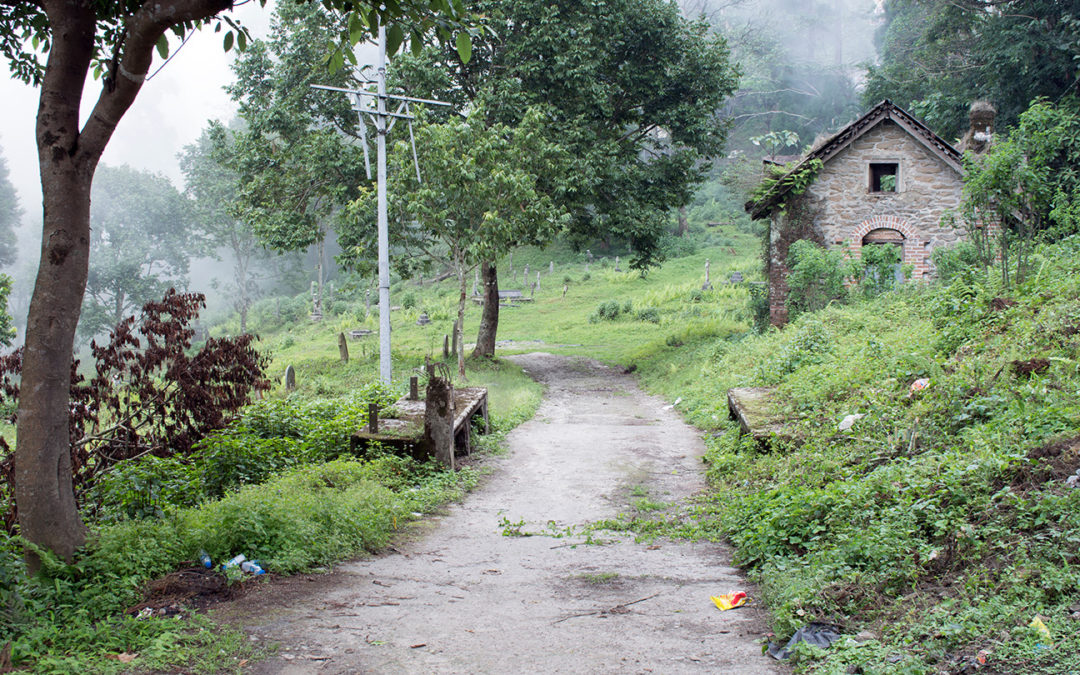Photo by Kakoli Dey / Shutterstock.com
There was a man dwelt by a churchyard. His wife was the enormous yew tree that shielded him from all. His children came by as autumn leaves, or as some say, they were the cattle that died grazing upon the yew. Sometimes the man coughed so hard, he’d want to be taken out to sea. But they’d trick him — his wife and his cattle-children — saying, the season’s changed and Christmas’s here, when nothing ever changed at all. So he’d stay, alone and despondent, because the churchyard’s haunted — everyone knows that. The man married again. Then again. All the widows of British soldiers. Women broke down on the pews, cried on the man’s shoulders, for he was a man who couldn’t see them suffer. They all became yew trees on which hung tiny ridiculous stuff — a hat, a veil, sometimes a ballerina. At nights, the churchyard would be a little merrier, with the souls rising and hanging about, the new yews by the man’s side. There would be thrill and drama, the odd prank upon the man growing terribly old. They’ll still say, in the end, This isn’t Christmas enough!
Had a generous laugh the last time I was there, until I felt a tug.
“The fainthearted should certainly avoid the place, which lies between the Dow Hill Road and the Darjeeling Forest office.” The man driving the bus wasn’t lying after all.
My friend and I looked at each other, though no one talked. The breeze was charming, the sleepy hillock on the other side just concealed by fog. We smiled, like it hadn’t happened. For the time being we managed to shrug it off. We walked by what we’d heard was the “Death Road”. The 140-year-old Victoria Boy’s School, adjacent to the churchyard, was closed for the winter vacations, and the caretaker had told us the previous day, he wasn’t sure it made headlines, especially since we said we read it was India’s most haunted place.
This time, I could swear, the sounds were nearer. “Do me a favor,” the first wife whispered, as though letting me in, on a family secret. “All of us want a happy place, all his new wives and I. Take the churchyard out. Ah! If only we had real fun, with kids running about!”
I’d have asked people to come in and not be fearful, re-imagined a fair, for the request was earnest enough. Dan clutched my hand, and looked at the yew tree, and I was sure he’d been told the same thing.
Soon we saw a horse skull atop a pole, dressed like Mary Lwyd, the way they do in Glamorgan. I saw the man’s legs, bony, jumping about; trailing him was the party of twenty yew trees; they were following Dan and me!
I am not telling this to anyone, but they sang and went up the bend, while we slid under a boulder and let them comfortably pass. Crouched under, and with our eyes almost popping out, we saw the parade move up the road, and following Mary Lwyd, request admittance at the red-bricked tea-house.
That night, I remember the folks at the homestay telling us, they had some lovely guests who feasted on food and ale. What a Christmas it was, they said.
Mandira Pattnaik is an Indian fiction writer and poet published in print and online in over 150 journals/magazines across fifteen countries. Her writing features in The Times of India, Best Small Fictions 2021, Citron Review, Passages North, DASH, Miracle Monocle, Timber Journal, Bending Genres, Gasher Journal, Watershed Review, Amsterdam Quarterly, and Prime Number Magazine, among other publications. Four-times Pushcart Prize-nominated, and thrice for Best Microfictions, and once for Best of the Net, her fiction has been translated and highly commended by editors including a placing in the Versification Contest 2021, Honorable Mention in CRAFT Flash Contest 2020, Highly Commended at Litro Magazine Summer Contest 2021, shortlisting at RetreatWest Micro Fiction and Strands International, longlisting at Smokelong Comedy Prize, Brilliant Flash and AWC Furious Fiction. Mandira’s microchapbook ‘In the Glow of a Velvet Moon’ was published by Ghost City Press (Sep 2021).

